Hello, and welcome back to another dev diary! Today we are going to talk about Freedom. Freedom from Fear. Freedom from Want. Freedom from having to vote for a presidential candidate every four years.
The vanilla US focus tree offered some interesting alternate-history scenarios, but if you wanted to play historical, you pretty much sat around doing very little until the war started. Part of this is the fundamental design problem of the US in a historical grand-strategy game: if we allow the US to freely enter the war when it has even a fraction of its historical economy, the Axis never makes it into Paris and the war ends in 1940. If we restrict the US from entering the war freely until its historical date, the US player sits around until late 1941 doing very little (there is a reason why my usual go-to scenario in HoI2 and HoI3 was “Play France until you lose, then switch to the US”).

So one of the goals we had for this rework was to give the player a bit more stuff to actually do during the lead-up to the war. Making the path out of the depression a little more involved was an obvious place to start. Instead of a single national spirit, it is now three levels that give a smoother curve out of the depression. But instead of just taking three focuses in a row to do what could previously be done in one, we wanted the player to have to work a lot more to get out of the depression.
Enter the script-based Congress Mechanic. The Congress mechanic is - for now - unique to the US and simulates the shifting majorities in both houses of Congress. It ties into a lot of things that we will get into in a bit. But on a fundamental level, taking the focuses that reduce the penalties from the great depression will require you to have a majority in both houses, but will also reduce your support once you have taken it to simulate members of Congress who voted for the proposal being unwilling to support you further without getting something in return.

You can gain and lose support from random events as well as midterm and presidential elections. Generally speaking, going with the incumbent means you are more likely to lose support in Congress in the election, and if the situation is particularly dire, going with the challenger will flip support and opposition. Beyond this, a number of decisions allow you to gain support in congress, from simple lobbying to bribing members of Congress by investing in their constituencies to just regularly bribing them.
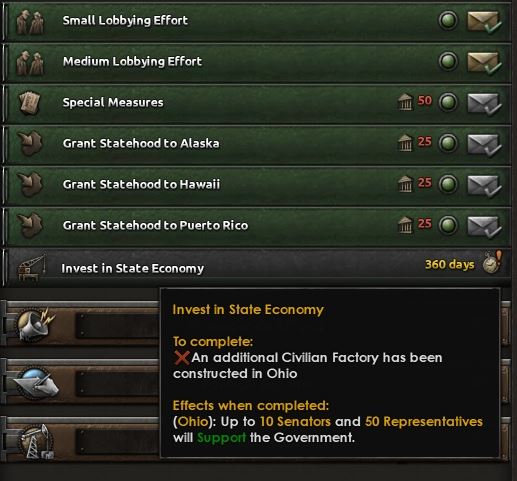
Besides getting out of the depression, you’ll also need to get Congress to sign off on the Selective Service Act, which is the gatekeeper focus of the army modernization branch, and the Two Ocean Navy Act, which is the gatekeeper focus for the naval branch. The amount of support you need depends on your war support (in general, you can assume that every focus with “Act” somewhere in its title ties into the Congress mechanic).
Another aspect we wanted to add was to give the US player a choice to become more active in the world earlier. As I said above, that comes with host of issues. We want it to be a viable option, but not a no-brainer. This means that there will be a number of restrictions in the “Limited Intervention” branch. First, you’ll have to have enough support in Congress to take the focus (and a lack of war support means that quite a few member of Congress will break ranks over it). Afterwards, you will have to choose between focusing your efforts on preparing to intervene in Europe or in Asia. Taking either of these focuses unlocks a number of decisions to try and build public support for an intervention. Many of these decisions are tied to events around the world - here the US is protesting the Anschluss.
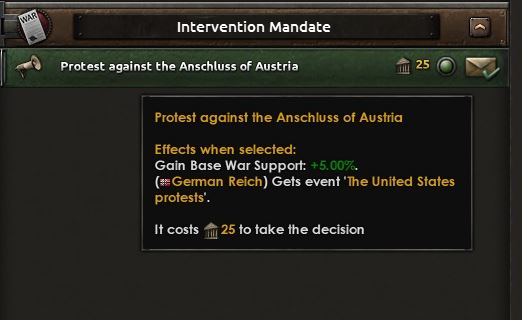
However, there is only a small window to utilize these events. Each decision adds something that is internally called an “intervention strike” as in “three strikes and you’re out”, except in this case it’s “three strikes and we start bombing”. A generic decision allows to build support against a target if they do not have specific decisions associated with them. Finally, once a country has two strikes against them, you can petition congress to sanction an intervention, which will again require significant support (it is easier to gain a wargoal against a country that is at war, and easier still if they are in an aggressive war).
This will likely make it harder for you to pursue your other goals - so if you want to intervene in Europe on behalf of the Allies, you will most likely have to forego economic reforms, at least for a while.
The intervention mandates are also used to allow the US to intervene in the Americas if someone violates the Monroe doctrine.
Intervention in general is something you can prepare a lot better now by using war plans. Completing the focuses unlocks a decision to execute the corresponding war plan and gain a temporary bonus against a country, along with some other temporary bonuses.

Of course, by this point a statistical majority of you might wonder why you even bother with all this busy-work, bribing senators, cutting deals with representatives, when there is a world to be won. As promised, we also wanted to add proper alternate ideology branches for the US. As we said many months ago in the Dev Diary about South Africa, we also look to try and open up new areas of the map for warfare, to allow you to fight in different areas than trudging across the same old parts of Europe.
So we wanted to have a nice big Civil War in the US. We want tank battles south of Chicago. Naval landings in Florida. A brutal slog across the Rocky Mountains. So we decided to not just put in one civil war but two! That’s a whole 100% MORE CIVIL WAR!
You’ll have to fight a civil war in either of the alternate ideology branches. For the curious: the branches straight down from the WPA and Adjusted Compensation Act are democratic ideology branches and will be part of the free update, the branches starting with Suspend the Prosecution and America First will be part of the DLC.
In the left branch, appropriately enough, you soften up your stance towards the communists. You can do this even if you don’t intend to go fully communist, as it opens up new ways of gaining support in Congress. If you do decide to be more radical, you can desegregate the American society, which will trigger protests from the usual suspects. The protests by themselves don’t do anything, but if you decide to push harder towards communism, the protests will intensify and eventually spill over. The Unions Representation Act is another such trigger that will cause protests.
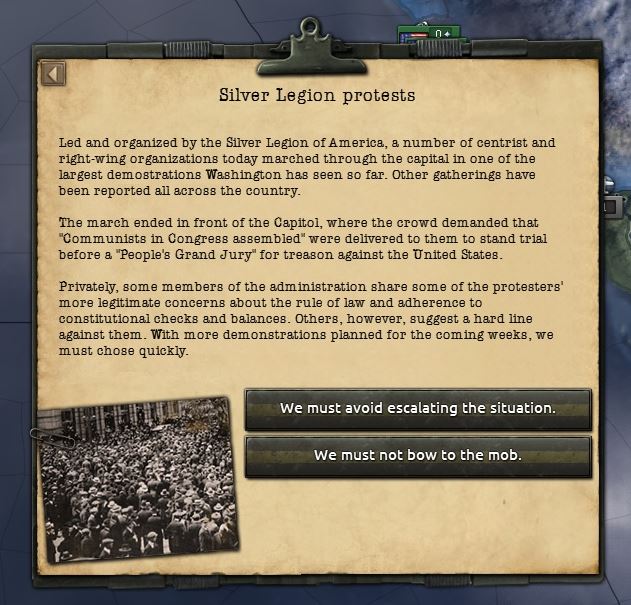
Before the civil war breaks out, there is a “Point of No Return” after which it is merely a question of time until hostilities start. In the time between the Point of No Return and the actual start of the war, you’ll get a number of events telling you how the situation develops. These events have actual effects on how your position is like at the start of the war.
For example, if an event tells you that a state has mobilized the national guard, the revolter gets a fully-equipped and quite capable division when the war starts. These events aren’t intended to make the difference between winning and losing but to give the war a bit more flavor.
Once the war starts in the communist branch, it is not quite like a regular civil war. Instead of the country and the military splitting in half, it spawns a new tag (CSA). This allows us to do a few things, like removing CSA territories as cores for the US (which means that they, for example, create resistance when conquered into). Depending on how far down you’ve gone in the communist branch, a part of the country might also declare its neutrality during the war. You can still interact with this part through decisions, but so can the other side.
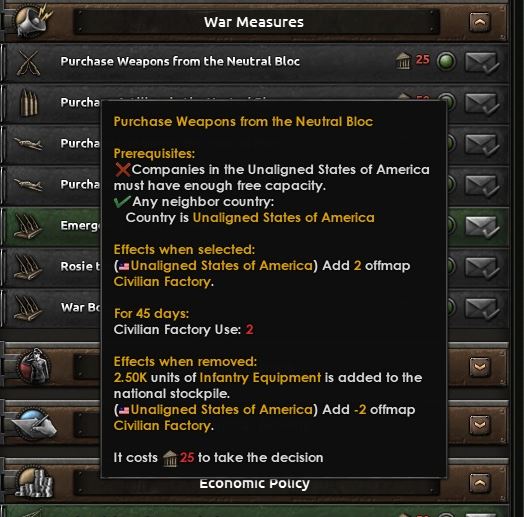
Where in other countries, a civil war is something we must be very careful with to ensure that the country is not completely crippled by the time the real war starts, here, we want ACWII to be “the war” the US gets into and which merges into the greater World War. So there are limited objectives for you after you have won the American Theater of World War II, but you can push decolonization in Asia and intervene in the Chinese Civil War, while also working to reintegrate the breakaway states.
The Civil War in the fascist branch works along similar lines. You also get a branch leading down from America First that you can use even if you don’t want to go full fascist - a sort of flirting with fascism, allowing you, for example, to investigate the opposition through the House Committee of Un-American Activities. The Voter Registration Act ensures a comfortable majority in every election, but triggers a wave of protests.
If you decide to push even further and publicly ally with the Silver Legion, you will trigger additional protests that put the country on the road to civil war. Like in the communist branch, a number of events determine what the starting position is, but the roles are reversed. Where in the communist branch, a part of the country tries to break away, in the fascist branch the country revolts against your leadership and tries to oust you from power, forcing you to fall back into a powerbase you set up in advance (you set up a powerbase in advance, right?). Parts of the country will declare in support or in opposition, leading to different front lines.
With much of the professional military on the other side, you’ll have to rely on hastily-raised militias to hold the line until you can get back on your feet. You might have to cut some deals and appeal to the locals to get them to accept that you are on their side.
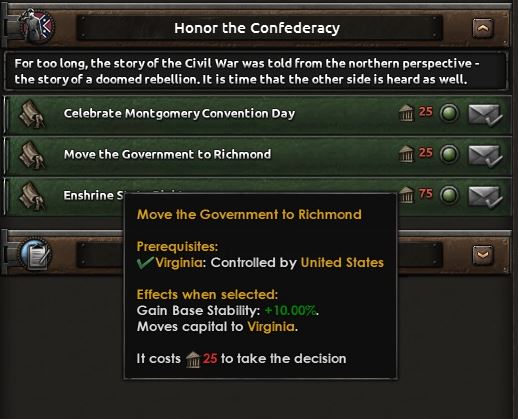
Once you have won that war, you are left with a US that is now safely fascist, which means that you are ideally poised to conquer the rest of the world. So we decided we might as well give you the focus tree to do just that. The War Powers Act lessens the stability impact of being in a war, and you can take your first steps abroad as you politely ask Canada to give you the territory between you and the Alaskan border (the event may or may not be called “Vancouver Or War!”) and politely ask Cuba to please stop being independent.
You continue in this fashion until at last you demand global hegemony and give all other majors an ultimatum to either become puppets or go to war. Along the way, you will most likely have gobbled up all the small countries that otherwise make conquering the world such a pain.
That is all for today. Next week we will be back with another look into the naval side of things.
The vanilla US focus tree offered some interesting alternate-history scenarios, but if you wanted to play historical, you pretty much sat around doing very little until the war started. Part of this is the fundamental design problem of the US in a historical grand-strategy game: if we allow the US to freely enter the war when it has even a fraction of its historical economy, the Axis never makes it into Paris and the war ends in 1940. If we restrict the US from entering the war freely until its historical date, the US player sits around until late 1941 doing very little (there is a reason why my usual go-to scenario in HoI2 and HoI3 was “Play France until you lose, then switch to the US”).

So one of the goals we had for this rework was to give the player a bit more stuff to actually do during the lead-up to the war. Making the path out of the depression a little more involved was an obvious place to start. Instead of a single national spirit, it is now three levels that give a smoother curve out of the depression. But instead of just taking three focuses in a row to do what could previously be done in one, we wanted the player to have to work a lot more to get out of the depression.
Enter the script-based Congress Mechanic. The Congress mechanic is - for now - unique to the US and simulates the shifting majorities in both houses of Congress. It ties into a lot of things that we will get into in a bit. But on a fundamental level, taking the focuses that reduce the penalties from the great depression will require you to have a majority in both houses, but will also reduce your support once you have taken it to simulate members of Congress who voted for the proposal being unwilling to support you further without getting something in return.
You can gain and lose support from random events as well as midterm and presidential elections. Generally speaking, going with the incumbent means you are more likely to lose support in Congress in the election, and if the situation is particularly dire, going with the challenger will flip support and opposition. Beyond this, a number of decisions allow you to gain support in congress, from simple lobbying to bribing members of Congress by investing in their constituencies to just regularly bribing them.
Besides getting out of the depression, you’ll also need to get Congress to sign off on the Selective Service Act, which is the gatekeeper focus of the army modernization branch, and the Two Ocean Navy Act, which is the gatekeeper focus for the naval branch. The amount of support you need depends on your war support (in general, you can assume that every focus with “Act” somewhere in its title ties into the Congress mechanic).
Another aspect we wanted to add was to give the US player a choice to become more active in the world earlier. As I said above, that comes with host of issues. We want it to be a viable option, but not a no-brainer. This means that there will be a number of restrictions in the “Limited Intervention” branch. First, you’ll have to have enough support in Congress to take the focus (and a lack of war support means that quite a few member of Congress will break ranks over it). Afterwards, you will have to choose between focusing your efforts on preparing to intervene in Europe or in Asia. Taking either of these focuses unlocks a number of decisions to try and build public support for an intervention. Many of these decisions are tied to events around the world - here the US is protesting the Anschluss.
However, there is only a small window to utilize these events. Each decision adds something that is internally called an “intervention strike” as in “three strikes and you’re out”, except in this case it’s “three strikes and we start bombing”. A generic decision allows to build support against a target if they do not have specific decisions associated with them. Finally, once a country has two strikes against them, you can petition congress to sanction an intervention, which will again require significant support (it is easier to gain a wargoal against a country that is at war, and easier still if they are in an aggressive war).
This will likely make it harder for you to pursue your other goals - so if you want to intervene in Europe on behalf of the Allies, you will most likely have to forego economic reforms, at least for a while.
The intervention mandates are also used to allow the US to intervene in the Americas if someone violates the Monroe doctrine.
Intervention in general is something you can prepare a lot better now by using war plans. Completing the focuses unlocks a decision to execute the corresponding war plan and gain a temporary bonus against a country, along with some other temporary bonuses.

Of course, by this point a statistical majority of you might wonder why you even bother with all this busy-work, bribing senators, cutting deals with representatives, when there is a world to be won. As promised, we also wanted to add proper alternate ideology branches for the US. As we said many months ago in the Dev Diary about South Africa, we also look to try and open up new areas of the map for warfare, to allow you to fight in different areas than trudging across the same old parts of Europe.
So we wanted to have a nice big Civil War in the US. We want tank battles south of Chicago. Naval landings in Florida. A brutal slog across the Rocky Mountains. So we decided to not just put in one civil war but two! That’s a whole 100% MORE CIVIL WAR!
You’ll have to fight a civil war in either of the alternate ideology branches. For the curious: the branches straight down from the WPA and Adjusted Compensation Act are democratic ideology branches and will be part of the free update, the branches starting with Suspend the Prosecution and America First will be part of the DLC.
In the left branch, appropriately enough, you soften up your stance towards the communists. You can do this even if you don’t intend to go fully communist, as it opens up new ways of gaining support in Congress. If you do decide to be more radical, you can desegregate the American society, which will trigger protests from the usual suspects. The protests by themselves don’t do anything, but if you decide to push harder towards communism, the protests will intensify and eventually spill over. The Unions Representation Act is another such trigger that will cause protests.
Before the civil war breaks out, there is a “Point of No Return” after which it is merely a question of time until hostilities start. In the time between the Point of No Return and the actual start of the war, you’ll get a number of events telling you how the situation develops. These events have actual effects on how your position is like at the start of the war.
For example, if an event tells you that a state has mobilized the national guard, the revolter gets a fully-equipped and quite capable division when the war starts. These events aren’t intended to make the difference between winning and losing but to give the war a bit more flavor.
Once the war starts in the communist branch, it is not quite like a regular civil war. Instead of the country and the military splitting in half, it spawns a new tag (CSA). This allows us to do a few things, like removing CSA territories as cores for the US (which means that they, for example, create resistance when conquered into). Depending on how far down you’ve gone in the communist branch, a part of the country might also declare its neutrality during the war. You can still interact with this part through decisions, but so can the other side.
Where in other countries, a civil war is something we must be very careful with to ensure that the country is not completely crippled by the time the real war starts, here, we want ACWII to be “the war” the US gets into and which merges into the greater World War. So there are limited objectives for you after you have won the American Theater of World War II, but you can push decolonization in Asia and intervene in the Chinese Civil War, while also working to reintegrate the breakaway states.
The Civil War in the fascist branch works along similar lines. You also get a branch leading down from America First that you can use even if you don’t want to go full fascist - a sort of flirting with fascism, allowing you, for example, to investigate the opposition through the House Committee of Un-American Activities. The Voter Registration Act ensures a comfortable majority in every election, but triggers a wave of protests.
If you decide to push even further and publicly ally with the Silver Legion, you will trigger additional protests that put the country on the road to civil war. Like in the communist branch, a number of events determine what the starting position is, but the roles are reversed. Where in the communist branch, a part of the country tries to break away, in the fascist branch the country revolts against your leadership and tries to oust you from power, forcing you to fall back into a powerbase you set up in advance (you set up a powerbase in advance, right?). Parts of the country will declare in support or in opposition, leading to different front lines.
With much of the professional military on the other side, you’ll have to rely on hastily-raised militias to hold the line until you can get back on your feet. You might have to cut some deals and appeal to the locals to get them to accept that you are on their side.
Once you have won that war, you are left with a US that is now safely fascist, which means that you are ideally poised to conquer the rest of the world. So we decided we might as well give you the focus tree to do just that. The War Powers Act lessens the stability impact of being in a war, and you can take your first steps abroad as you politely ask Canada to give you the territory between you and the Alaskan border (the event may or may not be called “Vancouver Or War!”) and politely ask Cuba to please stop being independent.
You continue in this fashion until at last you demand global hegemony and give all other majors an ultimatum to either become puppets or go to war. Along the way, you will most likely have gobbled up all the small countries that otherwise make conquering the world such a pain.
That is all for today. Next week we will be back with another look into the naval side of things.
Rejected Titles:
You will want fries with this focus tree
Making the world safe for fascism
Josh Lyman Simulator 2018
All focus trees are bigger in Texas
Communism is the right of all sentient beings
While writing this dev diary a bald eagle sat down outside the window and cried. True story.
My favourite state borders are Colorado’s
My google search history now makes me unemployable in most of the US
Fight them over here so we don’t have to fight them over there
This dev diary may contain trace amounts of political commentary
There was supposed to be a monarchist path but the Americans in the office rebelled and threw away all the tea
Team America saves the day
“Three strikes and we start bombing” would dramatically improve Baseball as a sport
https://twitter.com/alflandonlover gets the love he deserves
Actually rejected title: Make America <literally anything> Again
“Five score and two days ago our game director brought forth, upon this world, a new DLC announcement, conceived in liberty, and dedicated to the proposition that all gamers like American Civil Wars.”
You will want fries with this focus tree
Making the world safe for fascism
Josh Lyman Simulator 2018
All focus trees are bigger in Texas
Communism is the right of all sentient beings
While writing this dev diary a bald eagle sat down outside the window and cried. True story.
My favourite state borders are Colorado’s
My google search history now makes me unemployable in most of the US
Fight them over here so we don’t have to fight them over there
This dev diary may contain trace amounts of political commentary
There was supposed to be a monarchist path but the Americans in the office rebelled and threw away all the tea
Team America saves the day
“Three strikes and we start bombing” would dramatically improve Baseball as a sport
https://twitter.com/alflandonlover gets the love he deserves
Actually rejected title: Make America <literally anything> Again
“Five score and two days ago our game director brought forth, upon this world, a new DLC announcement, conceived in liberty, and dedicated to the proposition that all gamers like American Civil Wars.”


